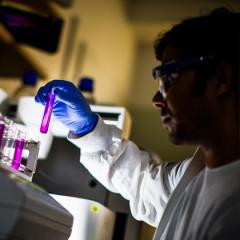AIBN researchers have won vital funding to address the spread of cancer and develop new technology that could fight off the next pandemic.
Two AIBN-led projects will share $2.3 million under latest round of the National Health and Medical Research Council’s (NHMRC) Ideas Grants scheme, a program which equips researchers with the resources to take an innovative approach to health and medical challenges.
Addressing cancer spread
Cell biologist Dr Samantha Stehbens - a joint appointment with the AIBN and the Institute for Molecular Bioscience (IMB) - will use her $1.4 million grant to expand knowledge on cell movement to develop anti-metastasis strategies.

Dr Stehbens’ research generally revolves around the fundamental mechanisms that regulate cell adhesion and the cytoskeleton.
She says the spread of cancer is responsible for 90 per cent of cancer-related deaths but there are still very few therapies that can target cells as they spread.
“To spread, cancer cells need to move in between other cell-types and structures that surround them,” she says.
“We have identified novel way to target those moving cancer cells, which makes them rupture and die. Our proposal will build on this finding and may establish new therapeutic combinations to prevent the spread of cancer.”
Dr Stehbens will tackle this project in tandem with IMB collaborator Dr Melanie White.
Diagnostics for COVID and beyond

Elsewhere, Dr Chris Howard has won $940,000 to develop technology that can better detect pandemic risk pathogens including coronaviruses, the flu, and even viruses that don’t yet exist.
Dr Howard will develop a suite of innovative nanoprobes for rapid response application in diagnostic platforms, boosting pandemic preparedness by using molecular discovery platforms to identify novel probes binding emerging covid virus variants.
“As well as tackling strains such as Omicron, this project seeks to create diagnostics against viruses which don't yet exist: Virus-X,” he says.
Two AIBN investigators involved in tiRNA project
Another two AIBN researchers were also named as investigators on a $1.4 million IDEAS project being led out of UQ’s School of Chemistry and Molecular Biosciences (SCMB).
Dr Selin Pars and Dr Helen Gunter will assist SCMB Professor Alexander Khromykh in investigating why flaviviruses induce cleavage of transfer RNA-derived fragments.
The project will investigate the role of tiRNAs in the host response to infection with pathogenic flaviviruses West Nile, Japanese encephalitis, Zika, dengue and yellow fever.
The main goal is to elucidate mechanisms of how these tiRNAs are generated during infection and how they contribute to the antiviral response




